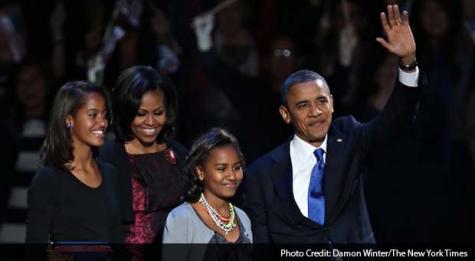President Barack Obama’s victory speech demonstrated two points of interest – amongst many – in the US election.
The first is the political importance of mums.
Exit polls cited by CNN suggested that, contrary to expectations, Obama was a majority winner amongst women overall, but he was an even clearer winner amongst mothers. CNN exit polls ranked Obama a 56-43 winner over Republican candidate, Mitt Romney, amongst mums. It was reported that some mums-to-be even dropped off to a voting booth on the way to hospital to ensure their vote was counted.
While definitive analyses are yet to be conducted or written, the early indications are that Obama was the preferred candidate for many women because of his stance on key areas of public policy such as health care, immigration and abortion rights over which there was a substantial difference between the candidates.
But Obama also showed that he ‘gets’ contemporary women – from his late grandmother who raised him to his intelligent, savvy Harvard law graduate wife through to his two daughters whom he described as “two strong, smart, beautiful young women, just like your mum.”
The second is the quality of the candidates.
A Washington insider made the point that both Obama and Romney are “good, decent men” and that the characterisation of each of them by the more extreme elements of their respective opposition was plain “silly”.
Nowhere was this more evident in Mitt Romney’s concession speech – which was more evident of the real Mitt Romney rather than the constructed one to appease the broad church of Republican interests.
In an election in which the individual ‘popularity contest’ was very even, as opposed to the electoral college vote which decides the outcome of the election, and which showed up the geographic and cultural divides of the United States, Romney was gracious and balanced in conceding defeat. It was, perhaps, his best speech of the campaign.
Barack Obama was Presidential. He was confident, conciliatory, certain and compassionate all at once. He also contextualised the campaign and where the United States stands in 2012 within the broad sweep of American history as a ‘work in progress’. Rather than repudiating those who disagreed with him, he welcomed it as a necessary hallmark of democracy and the catchcry of the American nation – liberty.
“We will disagree, sometimes fiercely,” he told his hometown crowd in Chicago.
“I know that political campaigns can sometimes seem small, even silly. And that provides plenty of fodder for the cynics that tell us that politics is nothing more than a contest of egos or the domain of special interests.”
But politics is big, he said.
“It’s important. Democracy in a nation of 300 million can be noisy and messy and complicated. We have our own opinions. But these arguments are a mark of our liberty.”
Watching and listening, it is impossible not to compare both Obama and Romney to Australian politicians, the leaders of our political parties and the level of Australia’s political discourse.
By way of comparison, on the same day a women’s magazine published a glossy eight page spread of the Prime Minister and six of her women Ministers discussing issues that were nominated as being of concern to women as well as answering a range of trivial questions such as whether they prefer the Beatles or the Rolling Stones and what girlhood poster they had on their wall. In a ‘special’ anonymous survey, we even learned that three of them would like more sex.
We can only hope that our male politicians don’t opt to do a similar group interview in an equivalent male magazine.
Instead, as we gear up for the election next year, let’s hope our politicians discover also that Australian women and mothers, like American women and mothers, are interested in real issues; are not taken in by glossy magazine spreads; and don’t really want to know, let alone care, whether their politicians want more sex or not.

















__small.png)










